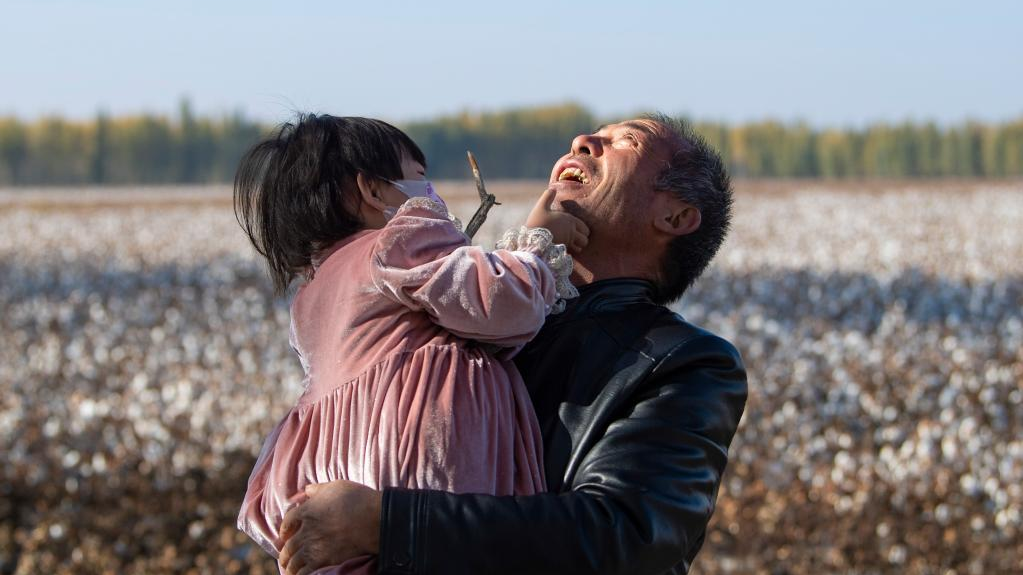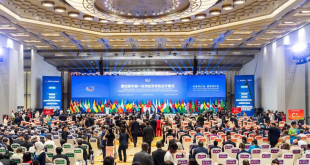Published:August 23,2022
By Keith Lamb

A cotton farmer holds his granddaughter at a cotton field in Shawan City, northwest China’s Xinjiang Uygur Autonomous Region, October 24, 2021. /Xinhua
I’ve made no qualms about criticizing the recent UN special rapporteur’s report on contemporary forms of slavery, which believes China is engaging in forced labor. The fact that the Western media has had a field day over two paragraphs without addressing the criticisms leveled against the West highlights a Cold War mentality against China.
I’ve pointed out that the funding for the sources used in the report comes from the U.S., which intends to prevent China’s rise. Much of the evidence has been debunked by independent Western media. Incredulously often the citations used as evidence use twisted logic to arrive at slavery. A story about poverty alleviation where a man was persuaded to take up goat herding, to lift himself out of poverty, became an example of forced labor.
Considering these serious criticisms, why did the special rapporteur, who is a professor at a British university, reach such conclusions? They may have their own political bias tilted toward a liberal world order. Perhaps they lack time to fact-check and trust the sources without looking into questions raised over the primary evidence.
For example, many of the sources are in Mandarin, a language that takes years to master. I can attest that there are elite Western sinologists who would have difficulty holding a basic Chinese conversation, never mind working their way through Chinese media articles. What hope then do we have for those whose academic background is not about China? In terms of the actual UN report, very little is on China. The author covers the entire world and the definition of modern slavery is broad. There are instances of chattel slavery but much of it talks about how minorities are, due to historical inequality and systemic bias, kept in conditions where they are unable to better their lives from one generation to the next.
In this regard, the biggest factor determining modern slavery is the unequal world order where the Global South is kept in a position of servitude in relation to the developed world. Under this order, the hegemonic master sees free development as threatening. Countries that seek emancipation are sanctioned or invaded. Even compliant countries may be shackled as was the case when Japan was on the verge of surpassing the U.S. in the 1980s.
As such, China’s development and its poverty alleviation represent another great achievement for breaking out of the global slave order. Furthermore, it seeks to bring this development to humanity through the Belt and Road Initiative (BRI).
Cross-border e-commerce packages are transported to Kazakhstan from Horgos, northwest China’s Xinjiang Uygur Autonomous Region, June 3, 2021. /Xinhua
Only the ideology of a hegemonic master could cast BRI development – building rail, ports, and roads – as a great evil while the “whip” in the form of political cues, stirring ethnic tensions, sanctions, and embargoes are propagandized as “just.”
It is no coincidence that the BRI runs through Xinjiang Uygur Autonomous Region. The global master would like nothing more than to turn it into another “Afghanistan rubble” while convincing the “slavish masses” that “this time”– despite Vietnam, Afghanistan, Iraq and Libya – it is for a good cause.
Before the “whip” is used, it must be justified. So does “Xinjiang atrocity” propaganda, which has led to sanctions and the funding of separatist groups. With this in mind, it is tragic that the special rapporteur believes the “Forced Labor Prevention Act of 2021,” which seeks to strangle Xinjiang, is a positive development in combatting contemporary forms of slavery affecting minorities.
It’s more than just about how slavery relates to the international system. Looking at the fine details of the report, where the author examines the main causes of contemporary slavery, China has evidently done more than any country to reduce the modern causes of slavery.
The report lists the following factors as some of the main causes of modern slavery: A lack of affordable education; not having the requisite language skills; inherited status and occupation; the negative effects of class, gender and religion; marginalized communities overlooked in public policies; stereotypes; the private public-school divide, and the problem of private land ownership monopolized by the former master class.
China excels in remedying all of these above-mentioned causes. I have personally taught poor students enrolled in affordable and subsidized university-level education, from all Chinese ethnic groups, which leads to generational changing outcomes. China follows a dual-language education system for ethnic minority students and the power of private schools is curbed.
The very goal of socialism, which prevents land from being monopolized by one class, is a destination on the path to the emancipation of humankind that seeks to bring equality to all members of society regardless of class. In China, the negative influence of extreme forms of religion that represses women is not allowed to take root.
When I think of the terrorist attacks that took place in Xinjiang, I’m reminded how the Chinese media, to avoid ethnic tensions, did not resort to the stereotypical clash of civilization reporting. Having visited Xinjiang and having witnessed the miraculous development, I am reminded that a goal of the Chinese Dream is to not have marginalized communities.
I am not saying China is perfect and neither do Chinese people believe this. Like all countries, it has much to improve on. What I do stand by though is that there seems to be no country that has done more to combat the causes of modern slavery than China.
Keith Lamb is a University of Oxford graduate with a Master of Science in Contemporary Chinese Studies. His primary research interests are China’s international relations and “socialism with Chinese characteristics.
cgtn.com
 Africa -China Review Africa -China Cooperation and Transformation
Africa -China Review Africa -China Cooperation and Transformation
